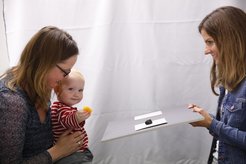BabyLab
The BabyLab at the Max Planck Institute for Human Development provides an ideal setting for conducting studies with children of various age groups—from 3-month-old babies to 6-year-olds.

As infants and young children are not yet able to express their thoughts in words, the BabyLab is set up to allow their behaviors and reactions to be observed as closely as possible. The researchers use a variety of techniques to record precisely what children look at, what they reach for, and the kinds of behaviors they show in carefully crafted experimental situations. These recordings allow them to make firm inferences about infants’ underlying cognitive processes. The tasks used depend on the study and the age of the children and may include, for example, watching short videos, interacting with various objects, or playing games.
The BabyLab has an adaptable stage that is used for live or video presentations of objects, as well as for eye-tracking studies, where children’s eye movements are recorded. The BabyLab is equipped with an EyeLink1000 eye-tracker, which allows eye movement to be measured at up to 2000 Hertz without any physical contact between the child and the device. A camera system set up specifically for the lab records the children’s behavior from multiple angles.
Study sessions last about 50 minutes in total, including the time needed to inform parents about the study and for the child to get used to the new environment. The study procedures are designed to make children feel safe and comfortable and typically last 5–15 minutes. At no time are there any risks for children or parents.
Importantly, there is no “correct” or “incorrect” way of behaving in the studies. The natural reactions and behaviors that infants and young children show during testing provide invaluable insights into the knowledge and skills of children of different ages.
